- Home
- H A CULLEY
The Strategos Page 10
The Strategos Read online
Page 10
‘But you are forgetting that Pausanius has also offered me a large payment in gold and silver for my help.’
‘A war will cost both of us dearly. Save the money you would have spent on the campaign and we will pay you what it would have cost us to fight you. You win both ways and we are no worse off.’
‘You can afford to pay me now?’
‘No, but neither can Pausanius. He relies on winning the throne to do so and even then he will be the ruler of a nearly bankrupt state, therefore his last priority will be paying you what he owes. On the other hand, King Alexander will pay you over a period of two years.’
‘You make a strong case, Philip. However, if I can’t trust Pausanius, why should I trust you or your brother to keep your word?’
‘Because I have given it to you.’
‘Sorry, not good enough. You can stay here as my guest until the sum we agree on is paid. Your captain and a few Companions, preferably the sons of influential nobles, will stay also. When your pledge is honoured in full you have my word that I’ll release you.’
Philip thought for a long moment. ‘I think we have the basis for a treaty. I want to continue my education and my military training whilst I stay with you though.’
‘Agreed. How long do you think you’ll need to stay here?’
‘I sincerely hope no longer than two years, basileus.’
Chapter Six – Regicide
370 to 368 BC
Having secured his northern border, Alexander turned his attention to the east. Pausanius, having lost the support of the Illyrians, was now reliant on Chalkidike and Amphipolis for help. They were well aware that a strong Macedon would seek to incorporate them in the kingdom once more and managed to extract a promise from Pausanius that he would formally acknowledge their independence.
At least Amphipolis wouldn’t be able to join his rival’s coalition. Having secured the agreement of the rest of Greece that it was an Athenian colony, Iphicrates was besieging the city by land and sea. Somehow, probably by charm and the lack of a better alternative commander, he had managed to regain the confidence of the Athenian Assembly and had been restored to his former position as their strategos.
Alexander wished that Parmenion was here as he knew Iphicrates well, but he was still in Illyria with Philip. He sighed. He could hardly send Ptolemy to negotiate with the Athenians; they hated the sight of each other. Perdiccas was the obvious choice but, at fourteen, he was inexperienced and didn’t have the maturity to deal with the wily Iphicrates. Nevertheless Alexander sent him but he also sent Dropides, a leading Macedonian noble and the commander of his Companion cavalry, to do the actual negotiation.
Perdiccas and Dropides arrived off Amphipolis on a Macedonian trireme and anchored near the Athenian fleet. They were then rowed across to meet the strategos on a quinquereme. This type of warship had been recently developed by Syracuse and the Athenians had built a prototype to learn how to use the larger and heavier type of galley. It was now serving as Iphicrates’ flagship.
They were escorted aft to a large area under the raised deck where the helmsmen and the ship’s captain stood. This part of the main deck had been enclosed with cotton drapes so that the strategos and his staff had some privacy, but the material did nothing to attenuate the sound of voices and Dropides had grave reservations about discussing secret plans in such a place. He needn’t have worried, the meeting was merely intended for the two sides to get to know one another. In this social setting Perdiccas was in his element and drank slightly more watered wine than was wise. Dropides kept quiet, answering specific questions when asked, and then only briefly. He was impatient to start negotiations proper and was therefore relieved when the strategos suggested meeting at noon the next day at a house in the countryside that Iphicrates had taken over as his headquarters on land.
The Athenian wasn’t about to admit it to the Macedonian delegation, but he was making little progress with the siege, even though the city was cut off by land and sea from supplies. It seemed that the inhabitants had stockpiled enough food to last them for a year or more. He therefore welcomed an excuse to abandon the siege and take to the field against the Chalkidikeans.
‘If I support you in your fight with the Chalkidikeans, what will you offer me in exchange?’
‘We have already supported your claim to the city when really it should be part of Macedon, what more do you want?’
Iphicrates laughed. ‘You’ve already voted for it to be Athenian so that is hardly a new incentive for our support.’
‘No, but the gold and silver mines in the Pangaion Hills were not included. We have a legitimate claim to them, but we are prepared to allow you to mine them for two years without opposition in exchange for your support now.’
Iphicrates thought about it for a while. He could just take over the mines, but he would then face opposition from Thrace and Macedon, as well as Amphipolis if he had to withdraw without taking the city. With Macedonian support for Athenian occupation, Thrace would probably remain neutral and Amphipolis would be powerless to intervene on its own.
‘Five years,’ he said, coming to a decision which he felt confident that the Athenian oligarchy would approve. The oligarchy had replaced the original democratic rule by all male citizens during the Peloponnesian War fifty years ago.
‘Three. You’ll have probably stripped the mines bare by then anyway,’ Dropides countered.
Suddenly Perdiccas intervened. ‘You can’t do that. My brother is depending on the wealth of those mines to build up the Macedonian army.’
Dropides groaned. What the young prince had said was true, however Alexander was prepared to allow Athens to think that he would go along with the agreement whilst planning to double-cross them once the problem of Pausanius and the Chalkidikeans had been dealt with.
‘That was before the current situation developed,’ Dropides said hurriedly as Iphicrates’ eyes narrowed in suspicion.
‘In that case, Macedon will send me troops by sea to join with mine in taking the mines over. Only when I have extracted three months’ worth of ore will I help you against Pausanius.’
Dropides had no option but to agree. He might curse the young prince as a naïve fool, but the damage had been done. He just hoped that Alexander would either live to a ripe old age or marry quickly and have sons of the same caliber as himself and Philip. He thought gloomily to himself that, if Perdiccas became king by some mischance, Macedon was doomed.
-o0o-
Parmenion was far from happy. Bardylis called himself the King of Illyria, but he really only ruled the Dardanians, the most powerful of the Illyrian tribes. The next most powerful tribe was the Ardiaei, who had their own king, but Bardylis treated him as a vassal. From time to time the Ardiaei rebelled against this and the year 369 BC was one of those times. Bardylis had assembled his army and was about to invade the territory of the Ardiaei when he surprised Philip and Parmenion by giving them commands in his army.
As hostages, they had hoped to accompany Bardylis on campaign, but as non-combatants. At first Parmenion, who was happy to serve Bardylis himself, had urged Philip to decline in order to minimize any risk to the young prince, but Philip thought that this would make him appear cowardly. Besides, he pointed out, it would be valuable military experience for him.
Although the Illyrians didn’t actually call a command of a thousand men a chiliarchy, that was the size of command that they were both given. However, Philip’s men were light spearmen and Parmenion’s were peltasts. When he found out that their men were to be given the honour of making the initial assault on the enemy line, Parmenion was even more suspicious. Philip was the type of youth to lead by personal example and in consequence the chances of him surviving the coming battle were slim. Parmenion smelt the hand of Ptolemy of Aleros in all this.
The strategos had recently married his lover, Eurydice. This had outraged many Macedonian nobles who felt that the former queen should have spent the rest of her life living quietly and mour
ning her dead husband. Parmenion tried to imagine what Ptolemy had to gain by engineering Philip’s death and came to the conclusion that he wanted him out of the way so that, should Alexander also die, he could assume power as the regent for young Perdiccas.
Although Perdiccas was Philip’s elder, the nobles might well support Philip as Alexander’s successor, rather than his ineffectual elder brother. Therefore Ptolemy no doubt thought it wise to get rid of him, and what better way of doing that than on a foreign battlefield. Parmenion tried to tell himself that this was all fanciful imagination and that, in any case, Eurydice would never be a party to the assassination of one of her sons. It was then that he realised that the former queen had been duped by Ptolemy and was merely a pawn in the strategos’ hands.
Parmenion was determined to preserve Philips’ life at all costs and he told the ten Companions who had remained with them that they were to stop the young prince from coming into contact with the enemy. At thirteen, Philip was stocky and fairly muscular for a boy his age. He had been taught how to fight with sword, shield and spear, but he was no match for a fully-grown warrior.
At first the advance into the territory of the Ardiaei went without incident. The first few houses – really little more than clusters of hovels for the farmers and their families - they came to were deserted. Not even a goat remained and foraging became a problem.
Then, as the neared the first city, the scouts came riding back to report that a large army was blocking their path. Bardylis rode forward to see for himself and took Philip with him. The ten Companions fell in behind the prince and when Bardylis told them to remain with their chiliarchy, they refused. The king grew red in the face and his bodyguard started to finger their swords. Philip’s men did likewise and the situation looked as if it was turning ugly. Parmenion became aware of the confrontation and rode up to join them.
‘Is there a problem here, basileus? Philip?’
‘I have ordered Philip to join my reconnaissance of the enemy army and told him that he won’t need his bodyguards as mine will be sufficient. However, they have ignored my royal command. They need to be punished.’
‘But they are only obeying my orders, basileus.’
‘What orders?’
‘That they are to remain with the prince at all times and to protect his life with their own.’
‘Protect his life? From whom?’
‘Why, the Ardiaei, of course. Who else could I have meant?’
Bardylis went red and looked at the ground for a minute.
‘I haven’t got time to sit here arguing with the likes of you. Stay here if you want to, Philip.’
With that the Illyrian king turned his horse and cantered off, his entourage and bodyguards hastening to catch up with him.
‘I am more certain that ever now that Bardylis seeks your death, and mine too no doubt.’
‘I agree, but I’m a loss about what to do.’
The two rejoined their respective commands and waited for the king to return. It was nearly dark before he did but they heard nothing further before they retired for the night. The next day the army was about to depart when two men arrived in the camp seeking the king. Shortly afterwards the remainder of Philip’s Companions, who had been sent back to Macedon the previous year, rode into the camp. Orestes dismounted and embraced Parmenion before turning to Philip.
‘Prince, your brother had paid the last of the money promised to Bardylis and so we have come to escort you home.’
‘Just in the nick of time,’ Parmenion whispered in his ear. ‘Bardylis was about to place us in the forefront of the coming battle and I have no doubt that he has been bribed by Ptolemy to do so. I’ll explain later.’
Philip mounted and rode over to the Illyrian king’s tent, Parmenion at his side and Orestes and the Companions following closely behind. When he got there a very irate Bardylis strode out of the tent.
‘What’s the meaning of this? Dismount immediately. We are not ready to depart yet.’
‘No, but we are. I’ve kept my promise lord king. As your treasury scribes have no doubt just told you, the last installment of the bribe paid to you has been delivered by the Athenians, who are now the allies of Macedon. Now it’s your turn to keep your promise and release me immediately.’
Bardylis chewed his lip. He had already accepted payment from Ptolemy to arrange for Philip and Parmenion to die in battle and he had used the money to finance this campaign. On the other hand, if he reneged on the arrangement to hold Philip only until the sum promised him for deserting Pausanius was paid he would be shamed and Illyria might well be attacked by Macedon and perhaps by Athens as well.
Well, he reasoned, there was little that Ptolemy could do if he broke the secret agreement he had made with him. The man wouldn’t want it known that he had tried to have his king’s brother killed. He really only had one option in the circumstances. He tried to smile, but failed.
‘Of course, Philip. I just thought that you might want to take part in your first battle. It would give you invaluable experience, you know.’
‘That’s not much use to him if he’s dead, basileus,’ Parmenion retorted.
‘Thank you for your hospitality, Bardylis. No doubt we’ll meet again soon; perhaps on another battlefield.’
There was no doubt about what Philip meant and he looked the Illyrian king in the eye for a long moment before he hauled his horse’s head around and started on the long journey back to Pella.
-o0o-
Alexander sat at the top of the slope beside Iphicrates as they watched the opposing army take up position at the base of the low hill. Pausanius had managed to persuade a number of Macedonian nobles to support him, mainly those who felt that their families hadn’t been sufficiently rewarded by Amyntas many years before when he had won the throne. However, they had only managed to field a thousand men between them. The majority of his forces came from Olynthus and the other city states in Chalkidike. A token force of two thousand had also been sent by Amphipolis, mainly because Iphicrates had lifted the siege when he went to Alexander’s aid and they felt that they should demonstrate their gratitude. They were also well aware that Athens would renew the siege should they and the Macedonians win this battle.
On the plain below Demetrius looked up at the army facing them from the midst of the Amphipolitan cavalry hipparchia. He wondered whether his former friends, Parmenion and Orestes, were amongst the enemy host. Of course, he had no way of knowing that they were still making their way back from Illyria. Like most of the men around him, he was well aware that Pausanius’ army faced two major disadvantages: they would be attacking uphill and they were outnumbered.
He watched as the peltasts advanced to harry the lines of hoplites on the forward slope of the hill. They seemed to make little impression on the enemy, most of their missiles striking the large round shields of the hoplites in the front rank. Then the Macedonian peltasts appeared on one flank and their Athenian counterparts on the other. Caught unawares, Pausanius’ peltasts suffered heavy casualties before the survivors managed to retreat.
Next the hoplites advanced, the chiliarchy of those Macedonians loyal to the pretender to their throne and two from Chalkidike in the lead. Two more Chalkidikean and the chiliarchy of hoplites from Amphipolis followed on. The usual battle of the shield walls followed but only the front ranks of the leading three chiliarchies were engaged. Then Demetrius spotted the Macedonian and Athenian cavalry emerging around the side of the low hill to attack the struggling hoplites in the flank. The peltasts then made a second appearance to launch their stones, javelins and arrows at the second line of chiliarchies.
Finally Pausanius gave the order for the cavalry to attack the peltasts and drive them off. Demetrius knew it was too late and by the time that his hipparchia were cantering up the slope towards the enemy peltasts on the left flank, the hoplites had given up the unequal struggle and had started to run back down the hill.
Demetrius was engrossed with chopping down the una
rmoured peltasts and didn’t notice that he was near the advancing enemy hoplites until it was too late. A spear glancing off his shield made him suddenly aware of his danger. He looked down at the hoplite who had lunged at him and saw him draw his spear back for a second thrust. Another Amphipolitan cavalryman chopped his sword down on the hoplite’s shoulder and he collapsed. By this time the two men were facing several more hoplites and they wisely beat a hasty retreat.
As Demetrius rode clear a Macedonian horseman lunged at him with his spear and his helmet was knocked off the back of his head. The horseman gasped and withdrew his spear, pushing up his own helmet as he did so.
‘Kionos?’ Demetrius was astounded. He knew that his former friend had stayed in Macedon to manage Parmenion’s estate but he hadn’t thought for a moment that he would have been expected to answer the summons when the Macedonian army was mustered.
‘Demetrius,’ the other answered. ‘Get out of here, Pausanius has lost this battle.’
The other nodded and had turned his horse to ride away when another Macedonian cavalryman swung his sword at his unprotected head. Kionos rode between them and used his shield to deflect the blow.
‘Go on, get out of here.’
‘Thanks, Kionos.’
As he rode away he heard a furious exchange commence between the two Macedonians. When the enraged man swung his sword at Kionos, accusing him of being a traitor, the latter had no compunction in stabbing him with his spear before riding back up the hill, hoping that no-one had seen him kill a comrade.
-o0o-
Alexander felt more secure on his throne but Pausanius was still at large. The latest reports said that he had taken refuge in Thrace. The country was in turmoil since the death of King Chales. Whilst his three sons were busy fighting each other for power, Thrace was in no position to help Pausanius and Alexander stopped worrying about him. That was a mistake.

 The Wolf and the Raven
The Wolf and the Raven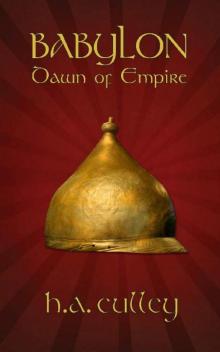 Dawn of Empire
Dawn of Empire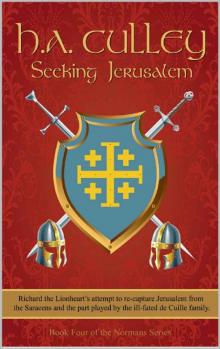 Seeking Jerusalem
Seeking Jerusalem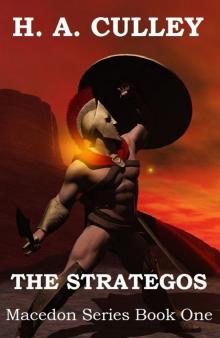 The Strategos
The Strategos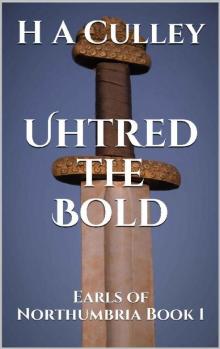 Uhtred the Bold
Uhtred the Bold The Path to the Throne
The Path to the Throne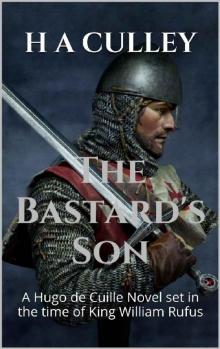 The Bastard's Son
The Bastard's Son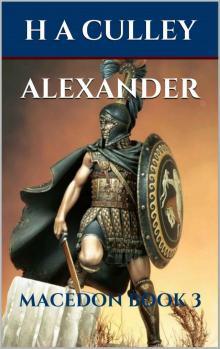 Alexander
Alexander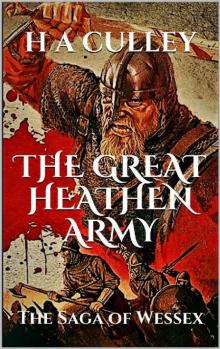 The Great Heathen Army
The Great Heathen Army The Sacred War
The Sacred War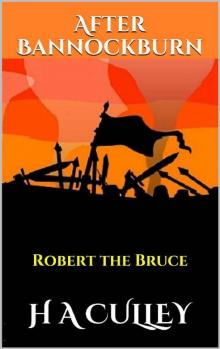 After Bannockburn
After Bannockburn Caging the Lyon
Caging the Lyon The Bastard's Crown
The Bastard's Crown WHITEBLADE
WHITEBLADE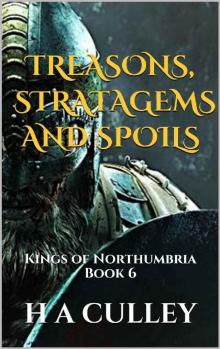 TREASONS, STRATAGEMS AND SPOILS: Kings of Northumbria Book 6
TREASONS, STRATAGEMS AND SPOILS: Kings of Northumbria Book 6 THE POWER AND THE GLORY: Kings of Northumbria Book 4
THE POWER AND THE GLORY: Kings of Northumbria Book 4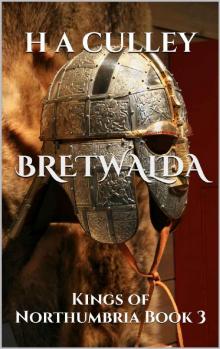 BRETWALDA: Kings of Northumbria Book 3
BRETWALDA: Kings of Northumbria Book 3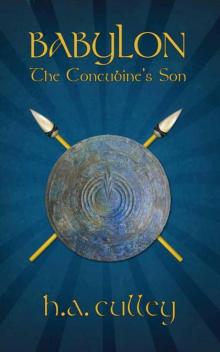 The Concubine's Son
The Concubine's Son The Fall of the House of Æthelfrith: Kings of Northumbria Book 5
The Fall of the House of Æthelfrith: Kings of Northumbria Book 5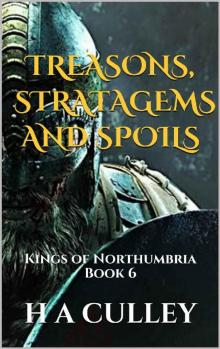 TREASONS, STRATAGEMS AND SPOILS
TREASONS, STRATAGEMS AND SPOILS THE POWER AND THE GLORY
THE POWER AND THE GLORY WARRIORS OF THE NORTH
WARRIORS OF THE NORTH The Fall of the House of Æthelfrith
The Fall of the House of Æthelfrith WARRIORS OF THE NORTH: Kings of Northumbria Book 2
WARRIORS OF THE NORTH: Kings of Northumbria Book 2 WHITEBLADE: Kings of Northumbria Book 1
WHITEBLADE: Kings of Northumbria Book 1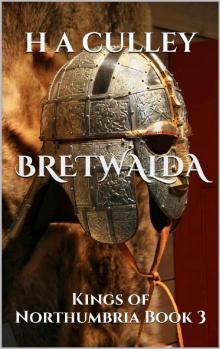 BRETWALDA
BRETWALDA